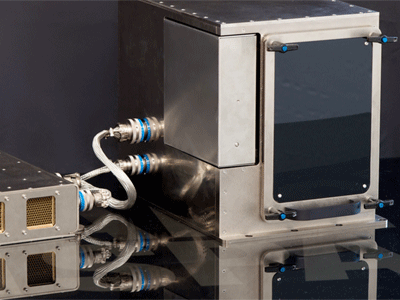Astronauts Getting 3-D Printer at ISS
Besides real-time replacement parts at the station, in the decades ahead, making entire habitats at faraway destinations like Mars.

The 3-D printing boom is about to invade space.

Nasa is sending a 3-D printer to the International Space Station in hopes that astronauts will be able to one day fix their spacecraft by cranking out spare parts on the spot.
The printer, made by a Northern California company called Made in Space, is among more than 5,000 pounds of space station cargo that's stuffed into a SpaceX Dragon capsule for a pre-dawn liftoff Saturday.
Besides real-time replacement parts at the station, Nasa envisions astronauts, in the decades ahead, making entire habitats at faraway destinations like Mars.
"If we're really going to set up shop on Mars," we have to do this, Jeff Sheehy, Nasa's senior technologist, said Friday. "We really can't afford to bring everything we need for an indefinite amount of time. We'll need to get to the point where we can make things that we need as we go."
At Kennedy Space Center, the company showed off a number of objects made by its 3-D printers. On display was a scaled-down model of an air filter that the Apollo 13 astronauts devised to survive their aborted moon mission in 1970. It took five hours to print the model in a lab.
SpaceX is making the supply run for Nasa, the same California company that just won a huge contract to deliver U.S. astronauts to the space station. Its Falcon 9 rocket with an unmanned Dragon was scheduled to blast off at 2:14 a.m., although rainy weather threatened to interfere.
Other Dragon payloads high on the cool or curious factor: a mouse X-ray machine and 20 mice; 30 fruit flies expected to have a population explosion in orbit, metal plating samples for a private research effort to build stronger golf clubs, and a $30 million instrument to measure the surface wind over Earth's oceans and improve hurricane forecasting.
The small 3-D printer on board is a demo unit meant to churn out sample items made from the same type of plastic used for Lego bricks.
It was designed to operate safely in weightlessness inside a sealed chamber. The printing process is the same as on Earth, creating an object with layer upon layer of plastic.
Once returned to Earth, the little 3-D creations will be "pulled and twisted and peeled and subjected to a lot of tests to determine the quality of the parts," said Sheehy.
Combined with efforts on the ground to make 3-D rocket parts out of metal ¡ª even entire engines ¡ª the space demonstrations "will give us confidence that the stuff we make by this method, even though it's new and innovative" does, indeed, have the durability of traditional parts, he said.
The space 3-D printer is barely a foot tall, 9{ inches wide and 14{ inches deep, counting the knobs on the front. A commercial 3-D printer ¡ª twice the size and dubbed "big brother" ¡ª will fly up next year, followed by a grinding machine for recycling discarded 3-D pieces.
"This is a huge, huge time for us," said Brad Kohlenberg, business development engineer for Made in Space.
The Mountain View, California, company has a staff of fewer than 25; most of them traveled to Cape Canaveral for Saturday's launch attempt.
This is the fifth space station shipment for SpaceX, counting the 2012 test flight. The space agency also is paying Orbital Sciences Corp. of Virginia to make periodic deliveries.
SpaceX, along with Boeing, won huge contracts Tuesday for delivering U.S. astronauts to the space station beginning in 2017. That will enable Nasa to stop relying so heavily on Russia, currently the only space station partner able to send crews up and down.
The Hawthorne, California, company founded by billionaire Elon Musk is shooting for its first crewed launch in 2016. The flight test crew will be a mix of Nasa and SpaceX employees, confirmed Hans Koenigsmann, vice president of mission assurance for SpaceX. He said the company is still working out the details on whom to send up.
AP
